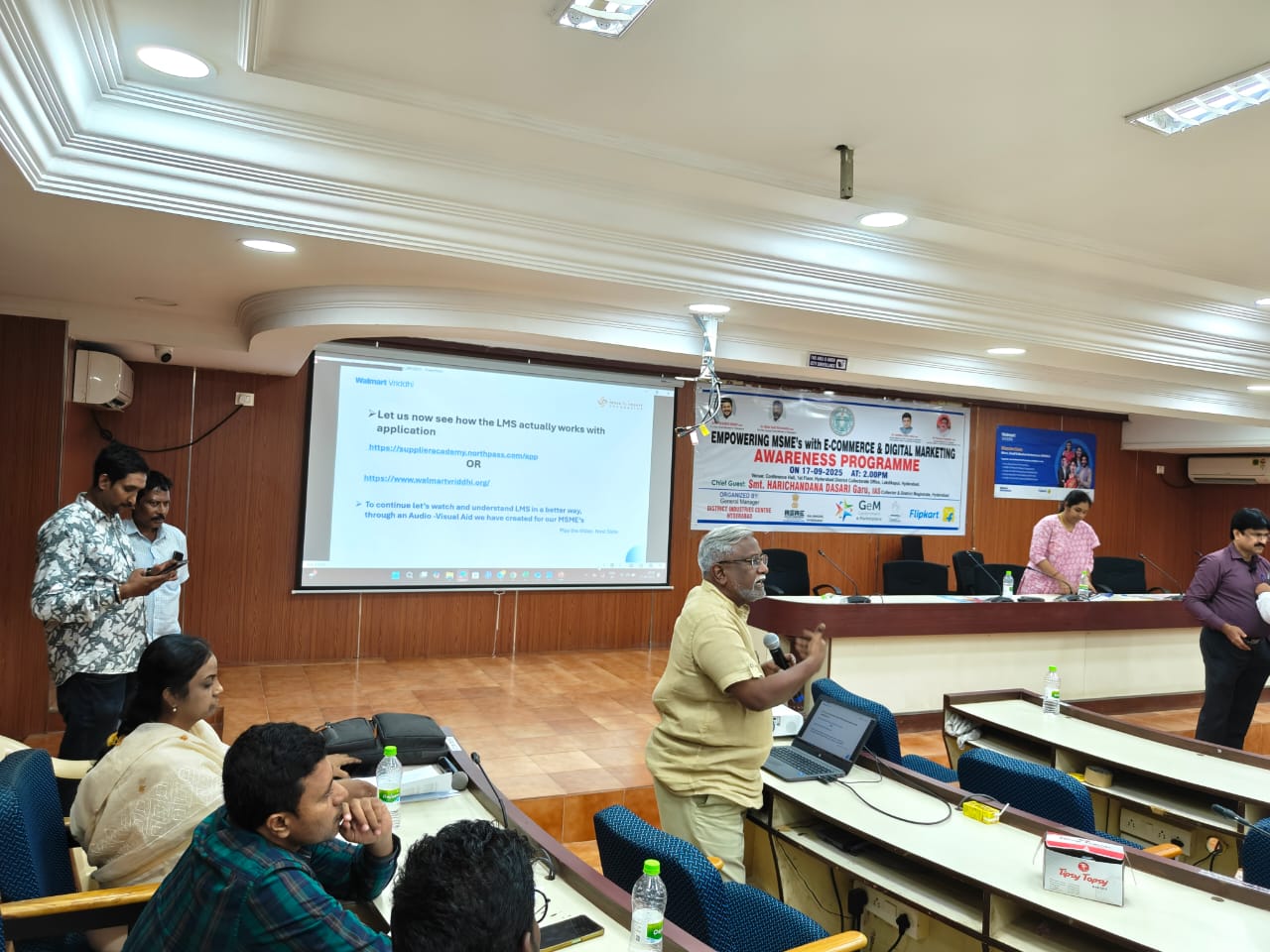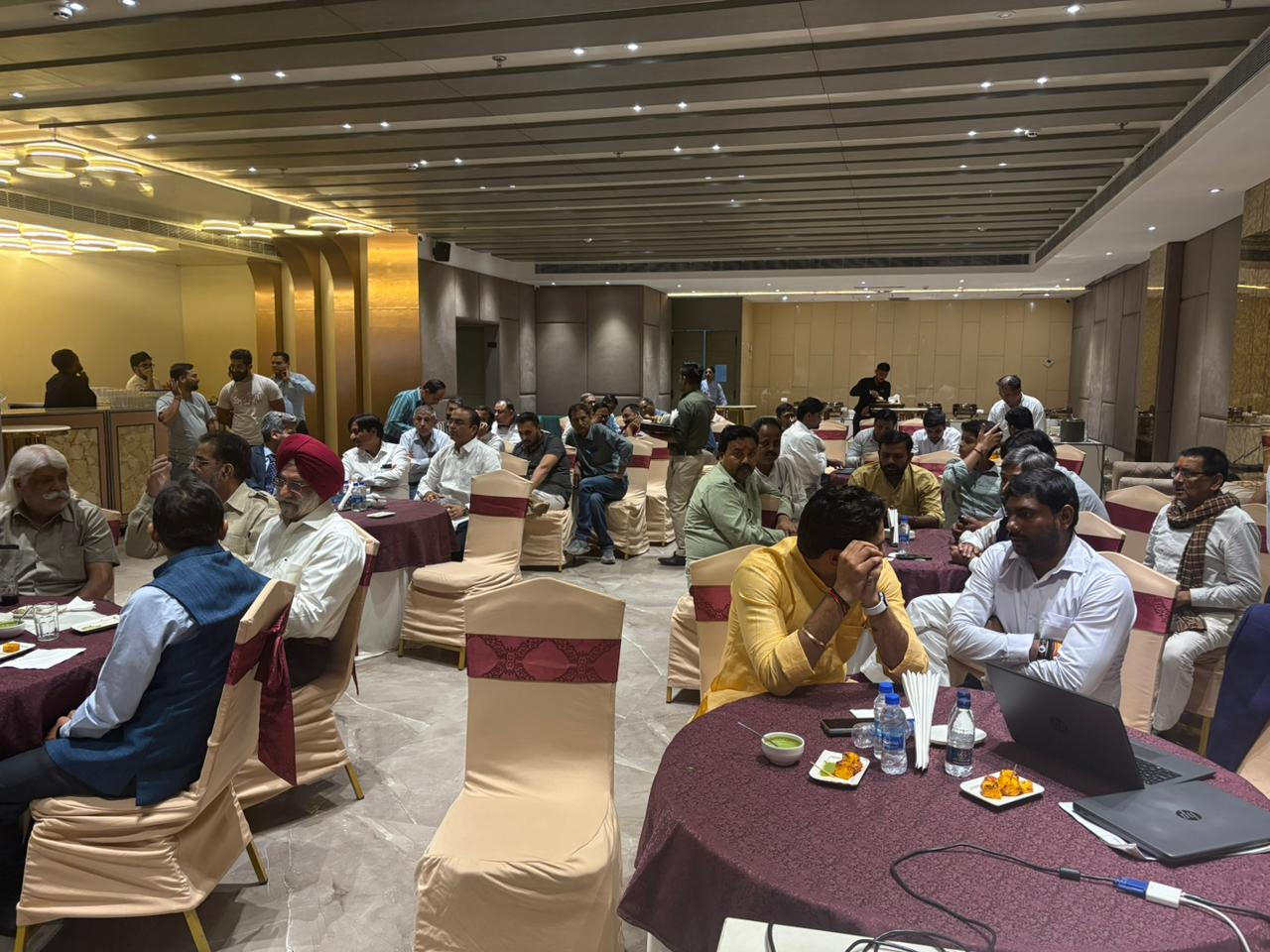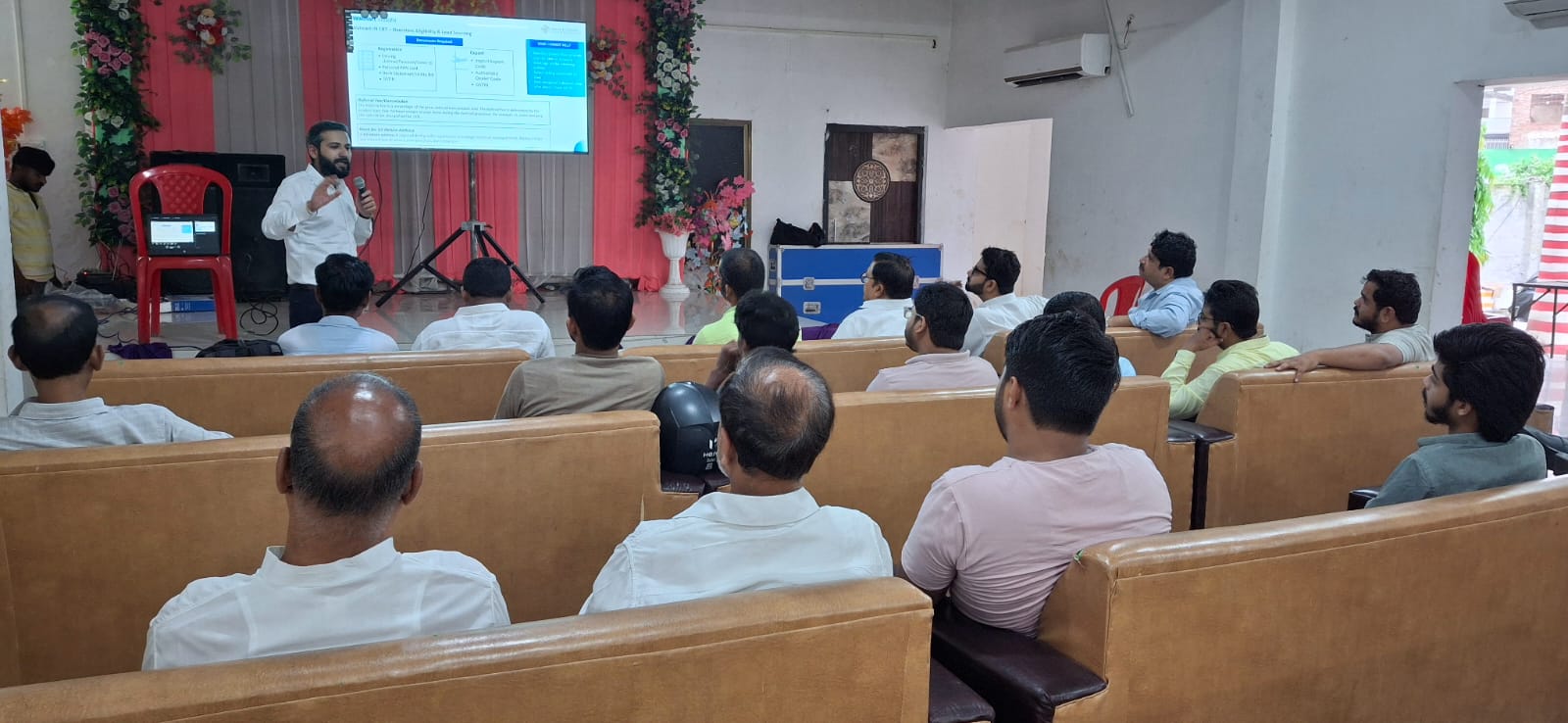





In September 2025, Walmart Vriddhi continued its efforts to empower MSMEs through a series of impactful masterclasses across India. Through partnerships with government bodies, development centres, and industry associations, the program engaged with entrepreneurs in Jaipur, Hyderabad, Shahdol, and Faridabad. It equipped them with digital skills, knowledge resources, and business tools to strengthen their enterprises and adapt to evolving market demands.
Walmart Vriddhi collaborated with the MSME Development Center to engage 45+ MSMEs in Jaipur. The session provided insights on business sustainability, digital enablement, and preparation of enterprises for future growth. Participants learned how Walmart Vriddhi’s free-of-cost training resources and marketplace access can support them in scaling their businesses.
In Hyderabad, 35+ MSMEs participated in a session organized in partnership with the District Industries Centre (DIC). The session focused on strategies for strengthening business models, adopting digital tools, and enhancing competitiveness in both Flipkart and Walmart Marketplace.
Under the Government of Madhya Pradesh’s RAMP initiative, a session was conducted in Shahdol, bringing together MSMEs to discuss opportunities for business growth. Entrepreneurs learned crucial aspects of business management, including finance, marketing, workforce management, and environmental sustainability.
In Faridabad, Walmart Vriddhi partnered with IMT Faridabad to deliver a masterclass for 25+ entrepreneurs. The interactive session underscored the importance of eCommerce adoption. It also highlighted how leveraging digital capabilities can unlock growth through Walmart Vriddhi’s business learning modules, personalized mentoring, and market access.
Through these ongoing engagements, Walmart Vriddhi continues to demonstrate the value of on-ground initiatives. These efforts enable MSMEs to modernize, scale, and achieve their domestic and international ambitions. By combining Walmart’s global supply chain expertise with Flipkart’s nationwide eCommerce ecosystem, the program empowers entrepreneurs to build successful and sustainable business models.




Walmart Vriddhi engaged with MSMEs in Mau, Uttar Pradesh to empower local artisans and microentrepreneurs with essential skills for business growth.
This initiative enabled MSMEs to gain market readiness and practical business opportunities. The sessions highlighted the program’s unique offerings— free-of-cost digital learning resources, market readiness support, and access to business tools and markets. The MSMEs were also oriented on the tools available by Walmart Vriddhi to integrate into Flipkart and Walmart Marketplaces.
The artisans of Mau explored how the program can support them strengthen their businesses, expand beyond their current markets, and how to adapt to changing consumer demands through digital enablement.
In Alwar, Rajasthan, Walmart Vriddhi partnered with Laghu Udyog Bharati (Small Industries Association) to host a Masterclass that brought together over 60 enthusiastic entrepreneurs. Designed as an interactive learning experience, the session provided practical insights on building sustainable business models, strengthening financial literacy, and adopting digital tools for growth.
Walmart Vriddhi also organized a masterclass in Mysuru, Karnataka, which was attended by 85+ MSMEs. Program officers facilitated onboarding for new sellers and addressed queries from existing ones. The sessions encouraged peer learning, enabling participants to share challenges and solutions while fostering a strong community of entrepreneurs driven by innovation and growth.
By combining Walmart’s global supply chain expertise with Flipkart’s pan-India eCommerce capabilities, Walmart Vriddhi continues to create opportunities that empowers small businesses thrive in an increasingly digital economy. Through partnerships and grassroots outreach, the program is scaling its impact across MSMEs of all sizes and across regions.
With every new MSME reached, every masterclass delivered, and every entrepreneur empowered, Walmart Vriddhi is fostering inclusive and sustainable growth for Indian businesses, helping unlock their potential to reach new national and international markets.

Ratlam, Madhya Pradesh, July 2, 2025: Walmart Vriddhi, through its program partner, the Ideas to Impact Foundation, signed a Memorandum of Understanding (MoU) with the Government of Madhya Pradesh. The MoU was formalized during the Regional Industry, Skill, and Employment (RISE) Conclave held in Ratlam, Madhya Pradesh on June 27.
This agreement, over the next three years, seeks to support the state’s MSME ecosystem by connecting interested and selected MSMEs to free-of-cost training support delivered by Walmart Vriddhi. Key initiatives undertaken by the program will include specialized trainings, seminars, and workshops to enhance MSMEs’ skills for digital transformation, expand customer reach, and secure market access across both online and offline retail channels. The state government will in turn provide crucial support by guiding MSMEs within the program, on available government schemes, according to their eligibility.
Launched in 2019, Walmart Vriddhi is a supplier development program tailored to empower MSMEs in India to modernize, scale and meet their domestic and international ambitions. The program brings together Walmart’s global supply chain expertise and Flipkart’s nationwide eCommerce reach, offering MSMEs access to free-of-cost training, mentoring, and business advice on finance, marketing, workforce management, and environmental sustainability. Since its launch, Walmart Vriddhi has successfully trained over 70,000 MSMEs. In its next phase, the program is partnering to reach an additional 100,000 MSMEs by 2028.
Jason Fremstad, Senior Vice President of Supplier Development, Sourcing, Walmart International, said, “India’s MSMEs are at the forefront of a digital transformation that’s reshaping how they grow, innovate, and connect with global markets. Our partnership with the government of Madhya Pradesh underscores our vision to empower MSMEs to become digitally ready, competitive, and expand their reach worldwide. Through Walmart Vriddhi, we aim to equip these entrepreneurs with the essential business skills, expansive market access, and strategic tools necessary to flourish in India and globally. We look forward to opening even more doors in India.”
Rajneesh Kumar, Chief Corporate Affairs Officer, Flipkart Group, said, “MSMEs form the backbone of India’s economy and play a vital role in driving inclusive growth. This partnership reflects our continued commitment to enabling small businesses in Madhya Pradesh to digitize, scale, and compete more effectively in the global economy. Through Flipkart and Walmart’s combined ecosystem, we are confident that local entrepreneurs will gain the tools, exposure, and support they need to thrive.”
Parul Soni, Trustee, Ideas to Impact Foundation, said, “Digital enablement, strategic skilling and mentorship, and expanded market access are the three levers driving MSME growth today. Through Walmart Vriddhi, we’re committed to equipping entrepreneurs with the training and personalized guidance they need to scale sustainably, compete on the world stage, and fuel inclusive economic progress.”
Building on the partnership in Madhya Pradesh and Haryana, Walmart Vriddhi will sign MoUs in other states, extending MSME empowerment across the country.
Walmart Inc. (NYSE: WMT) is a people-led, tech-powered omnichannel retailer helping people save money and live better — anytime and anywhere — in stores, online, and through their mobile devices. Each week, approximately 270 million customers and members visit more than 10,750 stores and numerous eCommerce websites in 19 countries. With fiscal year 2025 revenue of $681 billion, Walmart employs approximately 2.1 million associates worldwide. Walmart continues to be a leader in sustainability, corporate philanthropy, and employment opportunities. Additional information about Walmart can be found by visiting corporate.walmart.com, on Facebook at facebook.com/walmart, on X (formerly known as Twitter) at twitter.com/walmart, and on LinkedIn at linkedin.com/company/walmart.
The Flipkart Group is one of India’s leading digital commerce entities and includes group companies Flipkart, Myntra, Flipkart Wholesale, Flipkart Health+, and Cleartrip.
Established in 2007, Flipkart has enabled millions of sellers, merchants, and small businesses to participate in India’s digital commerce revolution. With a registered user base of more than 500 million, Flipkart’s marketplace offers over 150 million products across 80+ categories. Today, there are over 1.4 million sellers on the platform, including Shopsy sellers. With a focus on empowering and delighting every Indian by delivering value through technology and innovation, Flipkart has created thousands of jobs in the ecosystem while empowering generations of entrepreneurs and MSMEs. Flipkart has pioneered services such as Cash on Delivery, No Cost EMI, Easy Returns, and UPI. These customer-centric innovations focus on enhancing digital payment offerings for all customers while making online shopping more accessible and affordable for millions of Indians.
Ideas to Impact (i2i) Foundation, implementation partner of Walmart Vriddhi, is a nonprofit committed to driving sustainable human development through innovative, community-focused solutions. i2i partners with governments, civil society, and corporates to create scalable programs that empower marginalized communities and support the Sustainable Development Goals. The Foundation’s work spans education, health, environment, and gender inclusion, focusing on building resilient, inclusive societies. Rooted in collaboration and transparency, i2i Foundation strives to create lasting positive impact for a better future. Additional information about Ideas to Impact Foundation can be found by visiting:
i2ifoundation.org/about-i2i-foundation